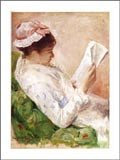 Vanessa and Her Sister: A Novel by Priya Parmar
Vanessa and Her Sister: A Novel by Priya ParmarMy rating: 3 of 5 stars
The Bloomsbury gang loved gossip. So do we aficionados of the gang and its satellites: Virginia Woolf, Vanessa Bell, Clive Bell, Ottoline Morrell, Lytton Strachey, etc. We read all the novels, biographies, letters, and journals; we delight in their scrapbooks and photo albums. These free-thinking Bohemian friends and lovers were juicy.
This novel casts itself as an olio of Vanessa Bell's writings - journal, letters - plus communications to, from, and amongst the group. The immediate problem is that Vanessa tells us that she's not a writer (and she was not), but the writing she attributes to herself is as adroit and adept as any word-slinger's. Her observations, especially of Virginia, are barbed; their aim is true. The result is great fun to read, if you don't mind a strange version of the unreliable narrator: the words do not fit the character.
That aside, the chronology is accurate, and some characters, especially Lytton Strachey in his bitchy brilliance, are quite memorable. Vanessa's art and Virginia's greed for her sister's attention anchor the novel, which takes place before Woolf or Strachey have published. Vanessa is deeply wounded by her sister and husband, whose never-consummated affair erodes her trust and sours her love for Virginia.
An afterword is included, with notes on what the characters were to achieve. I wish the author had mentioned the sexual abuse that Virginia experienced. Her portrayal as a beautiful, lethal monster, propelled by alternating bouts of mania and jealousy, is incomplete and strange without those facts.
Three stars: fun, with reservations.
I received this book from NetGalley as an ARC. This is an honest review.
View all my reviews



